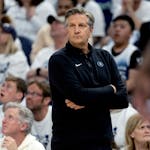After three days of pausing the playoffs to make a statement on racial inequality and call for justice in the case of Jacob Blake, a Black man who was shot by police in Kenosha, Wis., NBA players will resume the playoffs on Saturday, the league and players' association announced in a joint statement Friday.
Also in the statement was the product of talks between the players and owners as it pertained to renewing their fight against systemic racism. Part of those reforms included a call for every team that owns its arena to try to use that space as a polling place in the November election.
Multiple NBA teams have committed to that, but the Timberwolves don't own Target Center — the city of Minneapolis does. A city spokesperson said Minneapolis does not have plans to use Target Center as a polling place.
The league also agreed to form a "social justice coalition" with players, coaches and owners that will focus on a wide range of issues like voting rights and police and criminal justice reform, and it will work with players and network broadcast partners to create advertisements devoted to increasing civic engagement.
This was the product of tense moments over the past few days in which players contemplated walking out on the rest of the season after the Milwaukee Bucks did not take the floor for their Game 5 playoff matchup against the Orlando Magic on Wednesday.
Other leagues followed suit in postponing games, and after multiple meetings in which the players met among themselves and with owners, all sides agreed to work together to enable change while continuing the season.
National and local
The Wolves and Lynx have been undertaking similar initiatives with organizations and officials in the Twin Cities since the death of George Floyd and the calls for justice in the weeks that followed.
The Wolves have partnered with groups like RISE to create programs aimed at eliminating discrimination and promoting social justice.
Officials from the Wolves joined the Star Tribune on Friday to discuss their experiences with systemic racism and police brutality and how to address these issues.
"For myself, my colleagues, players, the city, mentally it's been draining," said Wolves player development coach Kevin Burleson, who played for the Gophers. "It's tough to process a lot of times. Coping skills are very important right now to help the mental health because just talking to a lot of my players and colleagues, that's been the biggest issue.
"Getting through the pandemic to the racial divide and all these different things, it's been tough in that way and [we're] trying to be normal — whatever that means."
Associate head coach David Vanterpool said Wolves players have wanted to make an impact on the community mainly in two ways: making sure people had essentials during the pandemic and aftermath of Floyd's death and via voting rights and registration.
"Especially when the uprising initially happened here in Minneapolis, that was something that was definitely on their hearts as far as trying to make sure they provide as much as possible," Vanterpool said. "Secondly, being involved with voting and making sure people have a platform to actually get their votes out there. Make sure they get into understanding the perspective of filling out a census and how that affects your community."
The Wolves have had conversations with Minneapolis Mayor Jacob Frey and Police Chief Medaria Arradondo related to how they can affect the community. Vanterpool mentioned they are organizing a voting drive, and a lot of their efforts are focused on helping and empowering young Black men and women.
"In life, what you would like for the next generation of young African American males, to be able to be comfortable, right, and have that relationship and know that things aren't going to happen," assistant general manager Joe Branch said. "You can drive after 8, after 9, after 10 when it's dark and you know that it's going to be a fair deal."
Added Burleson: "Most Black men when they grow up as kids it's kind of like they get numb to the situation. Racism was around me, but you just kind of knew this was the way of life. You're not really thinking it's even racism no more."





